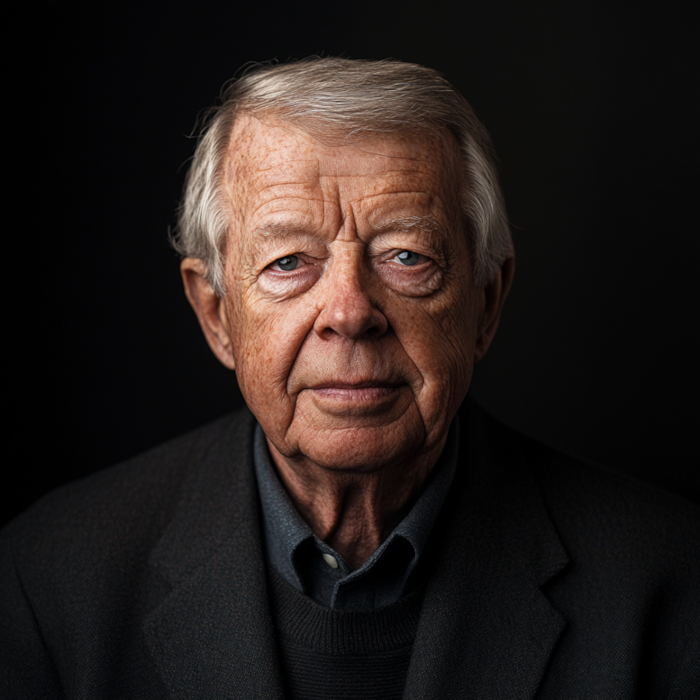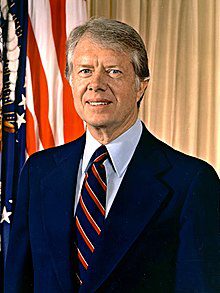

xPresident of the United States

Jimmy Carter (born October 1, 1924) is an American politician, diplomat, and philanthropist who served as the 39th President of the United States from 1977 to 1981. Before his presidency, Carter was the Governor of Georgia, and after leaving office, he became one of the most active and respected former U.S. presidents, known for his work in global peace, humanitarian efforts, and disease eradication. His post-presidency work earned him the Nobel Peace Prize in 2002. Carter’s legacy is defined by his dedication to human rights, democracy, and public service.
Birth and Family Background: James Earl Carter Jr. was born on October 1, 1924, in Plains, Georgia, a small town in the southern United States. He was the eldest of four children in a family that valued education and public service. His father, James Earl Carter Sr., was a successful local businessman and farmer, while his mother, Lillian Gordy Carter, was a registered nurse known for her work in the African-American community during the era of segregation.
Education and Naval Service: Carter attended the Georgia Southwestern College and the Georgia Institute of Technology before transferring to the U.S. Naval Academy in Annapolis, Maryland, where he graduated in 1946 with a Bachelor of Science degree. After graduation, Carter served in the U.S. Navy, where he worked on submarines and later became part of the nuclear submarine program under Admiral Hyman Rickover, a demanding leader who greatly influenced Carter's later leadership style.
Return to Georgia: In 1953, after the death of his father, Carter left the Navy to return to Plains, Georgia, to manage the family's peanut farming business. Under his management, the business grew and prospered, providing Carter with the financial stability to enter politics.
Early Political Involvement: Carter began his political career by serving on local boards, including the Sumter County Board of Education. His first foray into electoral politics was an unsuccessful run for the Georgia State Senate in 1962. However, he ran again in 1964 and won, serving two terms in the state senate. During his tenure, he was known for his efforts to reform government and his focus on education and infrastructure improvements.
Governor of Georgia (1971–1975): In 1970, Carter was elected Governor of Georgia. As governor, he implemented a series of progressive reforms, including reorganizing the state government to increase efficiency and advocating for civil rights. Carter's inaugural address as governor was notable for its call to end racial segregation and promote racial equality, a stance that was considered courageous at the time in the Deep South.
Presidential Campaign of 1976: Carter announced his candidacy for president in 1974, positioning himself as a Washington outsider who could restore trust in government following the Watergate scandal and the Vietnam War. His campaign emphasized honesty, integrity, and transparency, appealing to a nation disillusioned with politics. Carter won the Democratic nomination and went on to defeat the incumbent president, Gerald Ford, in the 1976 election, becoming the 39th President of the United States.
Domestic Policy: Carter’s presidency faced significant challenges, including high inflation, unemployment, and an energy crisis. He introduced a comprehensive energy policy that aimed to reduce American dependence on foreign oil, promote energy conservation, and develop alternative energy sources. The creation of the Department of Energy in 1977 was a key part of his energy strategy. Carter also focused on environmental conservation, expanding national parks, and protecting natural resources.
On social issues, Carter emphasized human rights, civil rights, and social justice. His administration supported affirmative action and increased funding for education and social programs. However, his domestic agenda was often hindered by economic difficulties, leading to public dissatisfaction and political opposition.
Foreign Policy and Human Rights: Carter’s foreign policy was marked by a strong emphasis on human rights, which he made a cornerstone of his administration’s international agenda. He criticized governments, both allies and adversaries, that violated human rights, and he sought to make U.S. foreign aid contingent on respect for human rights.
One of Carter’s most significant foreign policy achievements was the Camp David Accords in 1978, a peace agreement between Egypt and Israel brokered by Carter after intense negotiations. The agreement led to the signing of the Egypt-Israel Peace Treaty in 1979, for which Carter received widespread acclaim.
Another major foreign policy milestone was the signing of the Panama Canal Treaties in 1977, which transferred control of the Panama Canal from the United States to Panama by the end of 1999. This decision was controversial but demonstrated Carter’s commitment to international fairness and respect for sovereignty.
However, Carter’s foreign policy was also marked by challenges, including the Iran Hostage Crisis. In 1979, Iranian revolutionaries seized the U.S. Embassy in Tehran and held 52 American diplomats and citizens hostage for 444 days. Carter’s attempts to negotiate their release, including a failed military rescue mission, were unsuccessful, and the crisis became a significant factor in his defeat in the 1980 presidential election.
Defeat in the 1980 Election: Carter ran for re-election in 1980 but faced strong opposition from within his own party and from the Republican challenger, Ronald Reagan. The combination of economic difficulties, the ongoing Iran Hostage Crisis, and a perception of weak leadership contributed to Carter’s loss to Reagan in a landslide.
The Carter Center: After leaving office, Carter founded the Carter Center in 1982, a non-profit organization dedicated to advancing human rights, promoting democracy, and fighting disease worldwide. The Carter Center has been instrumental in monitoring elections, mediating conflicts, and supporting global health initiatives, particularly in the eradication of diseases such as guinea worm disease.
Nobel Peace Prize: In recognition of his efforts in promoting peace and humanitarian work, Jimmy Carter was awarded the Nobel Peace Prize in 2002. The Nobel Committee cited his "decades of untiring effort to find peaceful solutions to international conflicts, to advance democracy and human rights, and to promote economic and social development."
Advocacy and Public Service: Carter has remained active in public life well into his 90s, continuing to advocate for human rights, environmental conservation, and social justice. He has written numerous books on topics ranging from his presidency to his Christian faith and reflections on global issues.
Habitat for Humanity: Carter is also well-known for his long-standing involvement with Habitat for Humanity, an organization that builds affordable housing for those in need. He and his wife, Rosalynn, have participated in numerous building projects across the United States and around the world, demonstrating their commitment to service.
Human Rights Advocate: Jimmy Carter’s legacy is deeply tied to his advocacy for human rights, both during his presidency and in his post-presidential work. His focus on human rights in foreign policy set a new standard for American diplomacy, and his efforts through the Carter Center have contributed to peace and democracy in many parts of the world.
Environmental and Energy Policy: Carter’s early recognition of the importance of energy conservation and environmental protection has gained renewed relevance in the context of modern concerns about climate change and sustainability. His policies, although controversial at the time, are now seen as forward-thinking.
Post-Presidency Model: Carter’s post-presidency is often cited as a model for how former presidents can continue to contribute to society. His tireless work in global health, conflict resolution, and democracy promotion has set a high standard for civic engagement and public service.
Jimmy Carter’s life and career are marked by his dedication to public service, his commitment to human rights, and his efforts to make the world a better place. Although his presidency faced significant challenges, his post-presidential achievements have earned him widespread respect and admiration. Carter’s work through the Carter Center and his advocacy for peace, democracy, and social justice continue to inspire people around the world, solidifying his legacy as a true humanitarian and statesman.

We use cookies
We use cookies and other tracking technologies to improve your browsing experience on our website, to show you personalized content and targeted ads, to analyze our website traffic, and to understand where our visitors are coming from. Privacy Policy.